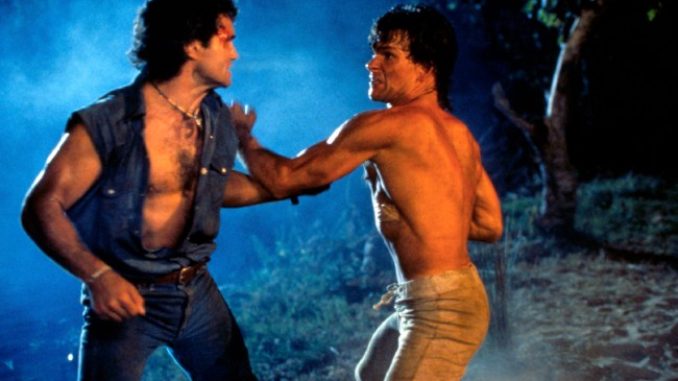
The original “Road House” screenwriter is entering the octagon with Amazon Studios and MGM — in a legal battle, at least. Screenwriter R. Lance Hill, who uses the pen name David Lee Henry, has filed a lawsuit against Metro-Goldwyn-Mayer Studios and parent company Amazon Studios for copyright infringement, as first reported by the Los Angeles Times.
Hill wrote the screenplay for the original “Road House” film in 1986; the movie was released in 1989. Hill says the copyright for “Road House” was set to revert back from United Artists to him in November 2023, and that he notified United Artists and its successor companies in November 2021 about his plans to recover the copyright for the “Road House” screenplay. He says he provided a “statutory notice of termination” that fits within the Copyright Act.
Hill further states that Amazon/MGM, aware of the copyright timeline, worked to complete the film during the SAG-AFTRA strike by using artificial intelligence. The suit says Amazon “went so far as to take extreme measures to try to meet this November 10, 2023 deadline, at considerable additional cost, including by resorting to the use of AI (artificial intelligence)” to “replicate the voices” of the actors in the 2024 remake. The film was completed in January 2024, two months after Hill’s stated copyright deadline in November 2023.
Amazon is holding its ground.
“The lawsuit filed by R. Lance Hill regarding ‘Road House’ today is completely without merit and numerous allegations are categorically false,” a spokesperson for Amazon MGM Studios told IndieWire. “The film does not use any AI in place of actors’ voices. We look forward to defending ourselves against these claims.”
Amazon/MGM has previously denied to IndieWire using AI to wrap up “Road House” production. That denial came after Joel Silver, who produced the original 1989 film, says he was fired from the new “Road House” after “raising concerns” about the use of artificial intelligence.
A source close to the “Road House” (2024) production said that if AI was utilized at any time during the production (or post-production), it would have been by the filmmakers during their early cuts; they had control of the editorial, not the studio. The source went so far as to say that Amazon MGM Studios expressly instructed the filmmakers to not use AI in the movie, and advised the filmmakers to remove any AI or non-SAG-AFTRA actors that were used to complete the film.
The source also stated that the copyright termination presented in Hill’s filing is most likely not effective.
The Copyright Act states that an author has “a five year period commencing 35 years after the date the rights were transferred” to terminate the studio contract, with the author able to serve the termination anytime up to two years before the effective termination date. Hill’s 2021 filing was two years exactly to the 2023 production start date of the new “Road House” remake.
Amazon owns the “Road House” (1989) rights through the acquisition of the MGM library. Hill says they ignored the copyright to its screenplay.
“Instead, defendants steamrolled ahead with the production of a remake of the 1989 ‘Roadhouse’ film derived from the screenplay,” his lawsuit reads. “Despite the 2024 remake’s obvious exploitation of the screenplay, defendants did not bother to secure a new license of film and ancillary rights.”
The legal matter between Hill’s claim to the “Road House” copyright, per the Los Angeles Times, hinges on whether Hill’s original script was written “on spec” with plans to pitch to studios, or if he was under contract with United Artists at the time of the screenplay’s completion.
“Hill had neither an employment nor a contractual relationship with United Artists when he wrote the screenplay,” the lawsuit states. “Rather, United Artists attained the 1986 grant from Hill well after the screenplay had been completed.”
Hill’s suit seeks to block the distribution of the film, which is set for a streaming-only release on Amazon’s Prime Video on March 21. “Road House” will open the 2024 SXSW Film & TV Festival; director Doug Liman has already publicly announced he is “protesting” the film’s release rollout due to its lack of a theatrical run.
SOURCE: IndieWire

